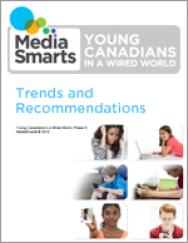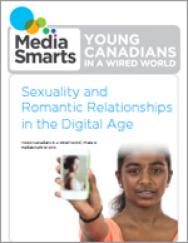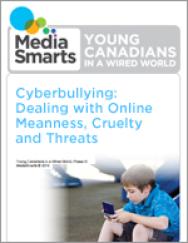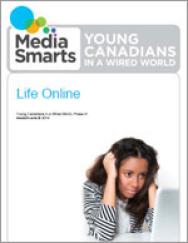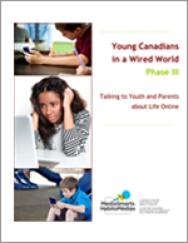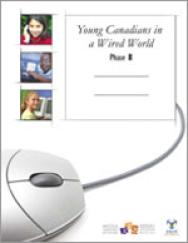Young Canadians in a Wired World, Phase III: Trends and Recommendations
This is the final report in a series of nine from the Young Canadian in a Wired World: Phase III study. The Trends and Recommendations report brings together the findings from interviews with children, teens, parents and teachers and a national survey of students in grades 4 to 11, which took place between 2012 and 2013. It offers recommendations for parents, teachers and policy makers to support young people in meeting the challenges of growing up in the digital age. It also includes an analysis of students’ top 50 favourite websites and profiles of students’ online activities organized by grade.
Young Canadians in a Wired World, Phase III: Encountering Racist and Sexist Content Online
This report is drawn from a national survey of Canadian youth conducted by MediaSmarts in 2013. The classroom-based survey of 5,436 students in grades 4 through 11, in every province and territory, examined the role of networked technologies in young people’s lives. Encountering Racist and Sexist Content Online (the sixth in a series of reports from the survey) looks at how often Canadian youth are exposed to prejudice online, how it makes them feel and how they respond to it.
Young Canadians in a Wired World, Phase III: Sexuality and Romantic Relationships in the Digital Age
This report is drawn from a national survey of Canadian youth conducted by MediaSmarts in 2013. The classroom-based survey of 5,436 students in grades 4 through 11, in every province and territory, examined the role of networked technologies in young people’s lives. Sexuality and Romantic Relationships in the Digital Age (the fifth in a series of reports from the survey) examines issues such as sexting, romantic interactions online, and accessing pornography and information about sexuality.
Young Canadians in a Wired World, Phase III: Experts or Amateurs? Gauging Young Canadians’ Digital Literacy Skills
This report is drawn from a national survey of Canadian youth conducted by MediaSmarts in 2013. The classroom-based survey of 5,436 students in grades 4 through 11, in every province and territory, examined the role of networked technologies in young people’s lives. Experts or Amateurs?
Young Canadians in a Wired World, Phase III: Cyberbullying: Dealing with Online Meanness, Cruelty and Threats
This report is drawn from a national survey of Canadian youth conducted by MediaSmarts in 2013. The classroom-based survey of 5,436 students in grades 4 through 11, in every province and territory, examined the role of networked technologies in young people’s lives. Cyberbullying: Dealing with Online Meanness, Cruelty and Threats (the third in a series of reports from the survey) looks at youths’ experiences with online conflict, the strategies they use to deal with this and who they turn to for support.
Young Canadians in a Wired World, Phase III: Online Privacy, Online Publicity
This report is drawn from a national survey of Canadian youth conducted by MediaSmarts in 2013. The classroom-based survey of 5,436 students in grades 4 through 11, in every province and territory, examined the role of networked technologies in young people’s lives.
Young Canadians in a Wired World, Phase III: Life Online
This report is drawn from a national survey of Canadian youth conducted by MediaSmarts in 2013. The classroom-based survey of 5,436 students in Grades 4 through 11, in every province and territory, examined the role of networked technologies in young people’s lives. Life Online (the first in series of reports from the survey) focuses on what youth are doing online, what sites they’re going to, their attitudes towards online safety, household rules on Internet use, and unplugging from digital technologies.
Young Canadians in a Wired World, Phase III: Talking to Youth and Parents about Life Online
This report sets out the findings of an exploratory qualitative research study that examined the attitudes and experiences of children, youth and parents relating to networked communications technologies.
Young Canadians in a Wired World, Phase III: Teachers' Perspectives
This study explores the attitudes of Canadian teachers regarding networked technologies in classrooms: do they enhance learning and what is the impact on the teacher-student relationship? Results indicate that there are significant challenges to overcome in integrating technology in meaningful ways that enrich the learning process. A number of best practices are also identified.
Young Canadians in a Wired World – Phase II Student Survey
In 2005, Media Awareness Network (MNet) surveyed young people across the country to find out about their Internet activities. The Young Canadians in a Wired World (YCWW) Phase II student survey, conducted by ERIN Research, explores new areas of interest and revisits some of the initial findings from the baseline study of 2001.

